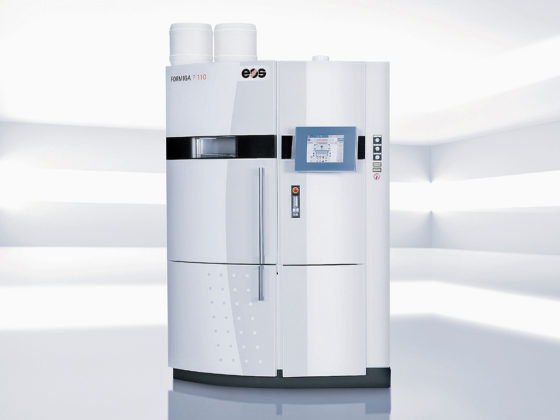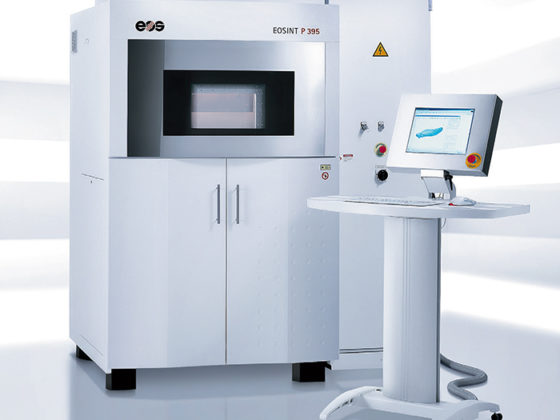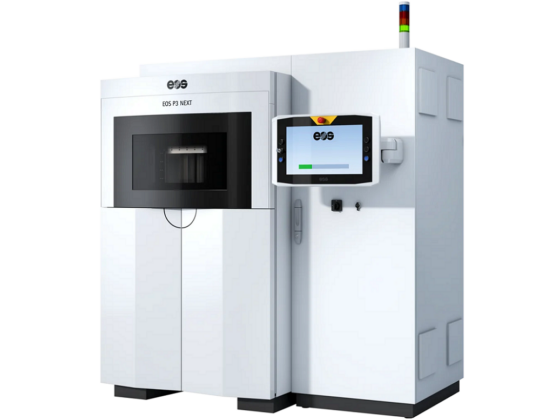Special polymers require special processing
High-performance plastics have exceptional mechanical and thermal properties.
However, there are also some challenges when printing these materials.
Best Part Tolerances
- The patented Adaptive Heating System analyses the printing geometry and adjusts the heating power to achieve always an optimum energy input. Without thermal post-treatment, you get even finer details and compliance with narrow tolerances. Due to the high stiffness and strength, even embossing dies for aluminium and stainless steel sheets can be printed.
New extrusion technology
- Our extruder was developed with flexibility and robustness in mind. The feed force, which is four times higher than that of the previous model, makes it possible to process fbre-reinforced high-performance polymers with a high percentage of filling. The specially designed filament guide automates the loading process.
Monitored Printing Process
- By integrating a camera system, temperature recording and the use of servo motors, the printing process is continuously monitored. This allows the printer to intervene independently when deviations occur.
Integrated Software
- The control software is specially adapted to our printer hardware and optimized for processing high- performance polymers. An intuitive user interface allows easy operation of the printer. You can manage print jobs and check the status of the printer at any time.
Documentation & Safety
- All the important parameters of a printing process are automatically made available in a PDF protocol. The integrated user management prevents unwanted access. For your data security, we have decided against cloud based solutions.
Reproducibility
- Integrated calibration routines guarantee consistent part quality. The software automatically notifies you of any maintenance work and guides you step-by-step through the procedures.
Technical Data
Apium P220 Build Size 205 x 155 x 150 mm Printer size 850x 685x 675 mm Nozzle Diameter 0.2 - 0.8 mm Layer Thicknesses 0.05 - 0.6 mm Wall Thickness >250 um Printhead-Temperature Up to 5409C Adaptive Heating Up to 180%C Printbed-Temperature Up to 160%C Print Bed Material Borosilicate glass Noise Emission < 55 dB(A) < 55 dB(A) Materials classifications
Product Class Product Name Main Properties PEEK PEEK 450 - Suited for applications thermal, chemical and mechanical - Reduce overall weight - Extend life time - Increase design freedom PEEK4000 - Improve layer adhesion - Improve mechanical properties PEKK PEKK CFR - Combination of PEEK and 30% carbon fibers - Enhance thermal and mechanical properties - Increase high stiffness - Improve thermal conductivity properties PEKK CFR 4000 - Enhance layer adhesion - Enhance mechanical properties PEI 9085(ULTEM) PEI 9085(ULTEM) - An unfilled engineering plastic with high strength and broad chemical resistance - Especially attractive for applications in the aircraft industry - Excellent flame retardancy PVDF PVDF - Offers stability in the form of thermal, chemical or ultraviolet conditions - Thermally resistant/structurally stable up till 149°C - Universally resistant to chemicals and solvents PEKK A PEKK A - Shows a great layer adhesion thanks to Temperature Management System - Semi-crystalline in nature but has been designed stay amorphous if desired - Can choose between amorphous toughness and crystalline strength PP PP - A low melting point thermoplastic with high chemical resistance - Which is used mainly in the handing of food, household appliances and fittings ABS ABS ESD - Comes in black color - Have tight dimensional tolerances - Create features for electronic assembly SMART ABS - An inexpensive and dimensionally stable polymer - Perfectly suitable for the production of covers, housings and components Vestakeepi4 Vestakeepi4 3DF - For medical devices and implants - Successful suitability according to ISO 10993 for bio-compatibility testing. Vestakeepi4 3DF-T - Undergone extensive testing, only for medical devices - A cheaper option to produce the first printed products




